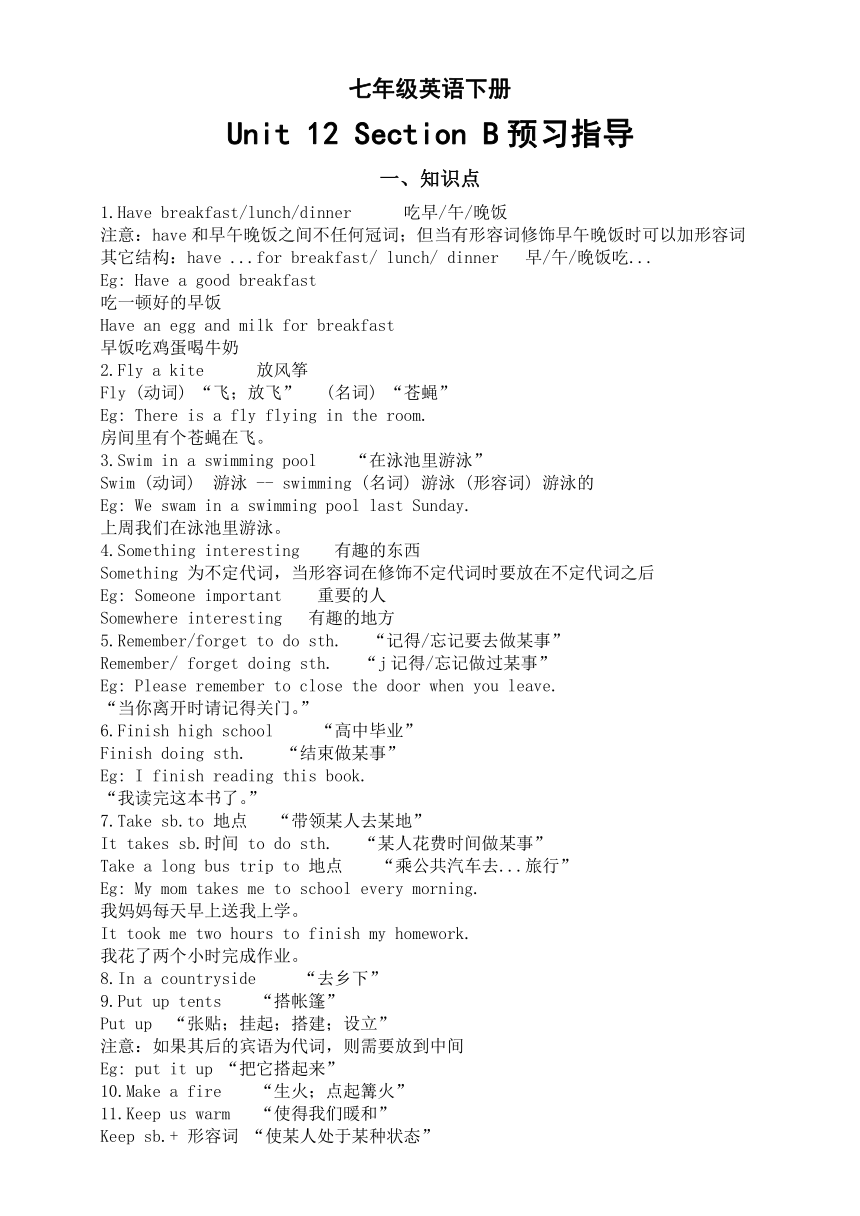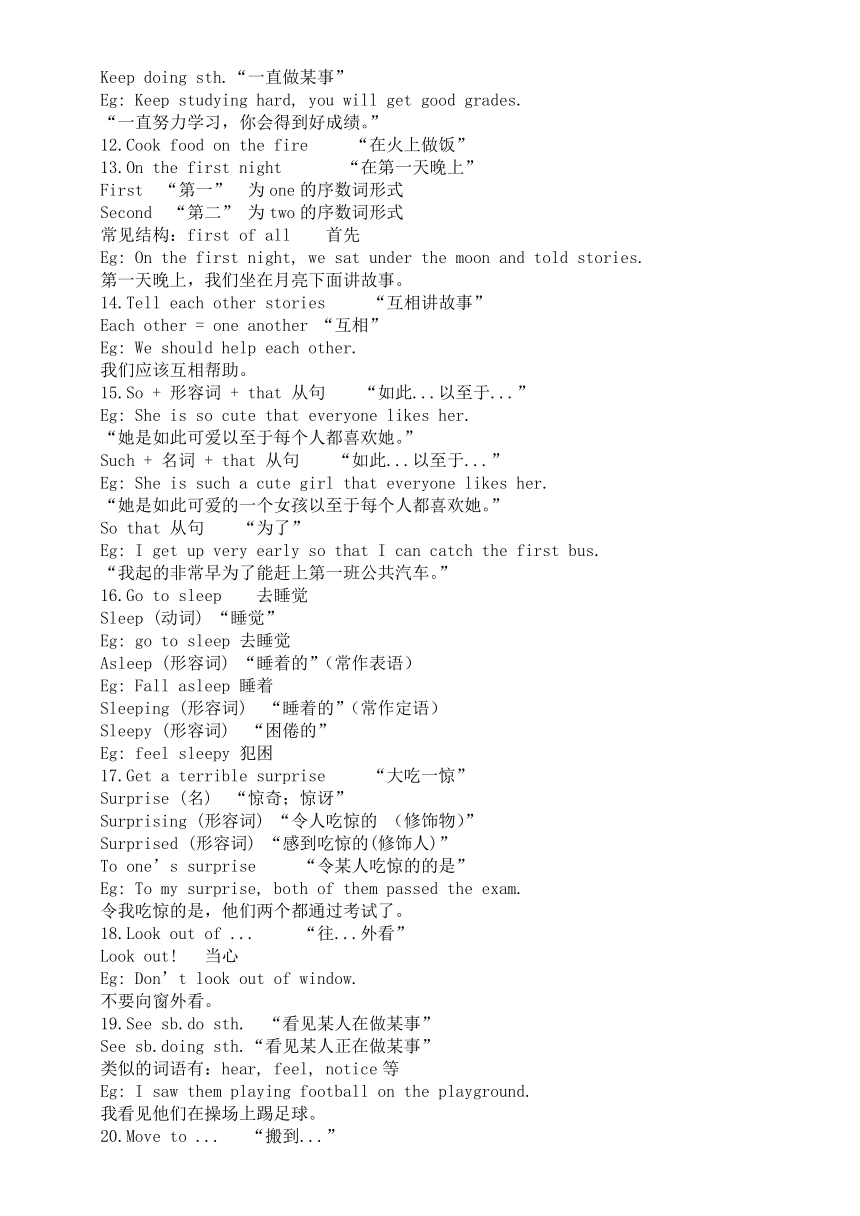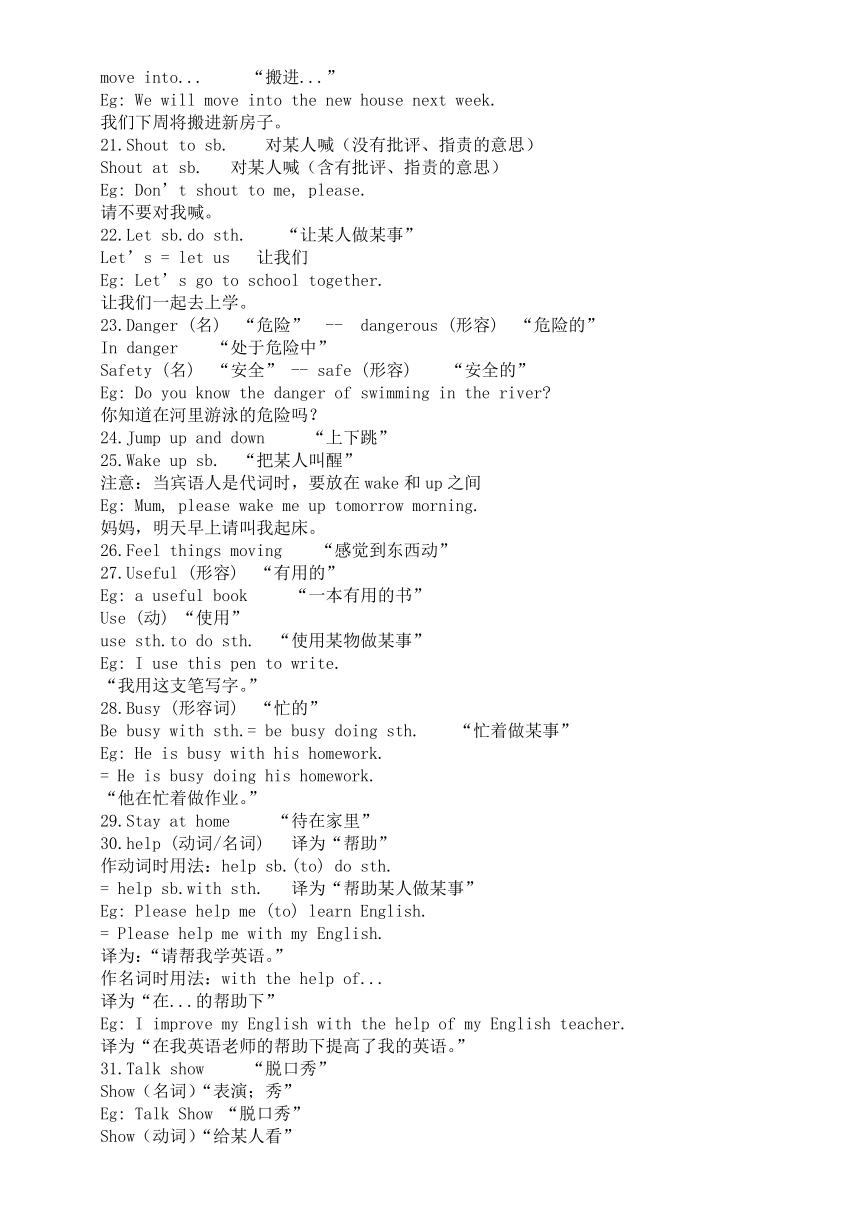人教版七年级下册Unit 12 What did you do last weekend? Section B预习指导(知识点+练习题)(含答案)
文档属性
| 名称 | 人教版七年级下册Unit 12 What did you do last weekend? Section B预习指导(知识点+练习题)(含答案) |  | |
| 格式 | docx | ||
| 文件大小 | 46.2KB | ||
| 资源类型 | 教案 | ||
| 版本资源 | 人教新目标(Go for it)版 | ||
| 科目 | 英语 | ||
| 更新时间 | 2024-05-31 15:50:46 | ||
图片预览



文档简介
七年级英语下册
Unit 12 Section B预习指导
一、知识点
1.Have breakfast/lunch/dinner 吃早/午/晚饭
注意:have和早午晚饭之间不任何冠词;但当有形容词修饰早午晚饭时可以加形容词
其它结构:have ...for breakfast/ lunch/ dinner 早/午/晚饭吃...
Eg: Have a good breakfast
吃一顿好的早饭
Have an egg and milk for breakfast
早饭吃鸡蛋喝牛奶
2.Fly a kite 放风筝
Fly (动词) “飞;放飞” (名词) “苍蝇”
Eg: There is a fly flying in the room.
房间里有个苍蝇在飞。
3.Swim in a swimming pool “在泳池里游泳”
Swim (动词) 游泳 -- swimming (名词) 游泳 (形容词) 游泳的
Eg: We swam in a swimming pool last Sunday.
上周我们在泳池里游泳。
4.Something interesting 有趣的东西
Something 为不定代词,当形容词在修饰不定代词时要放在不定代词之后
Eg: Someone important 重要的人
Somewhere interesting 有趣的地方
5.Remember/forget to do sth. “记得/忘记要去做某事”
Remember/ forget doing sth. “j记得/忘记做过某事”
Eg: Please remember to close the door when you leave.
“当你离开时请记得关门。”
6.Finish high school “高中毕业”
Finish doing sth. “结束做某事”
Eg: I finish reading this book.
“我读完这本书了。”
7.Take sb.to 地点 “带领某人去某地”
It takes sb.时间 to do sth. “某人花费时间做某事”
Take a long bus trip to 地点 “乘公共汽车去...旅行”
Eg: My mom takes me to school every morning.
我妈妈每天早上送我上学。
It took me two hours to finish my homework.
我花了两个小时完成作业。
8.In a countryside “去乡下”
9.Put up tents “搭帐篷”
Put up “张贴;挂起;搭建;设立”
注意:如果其后的宾语为代词,则需要放到中间
Eg: put it up “把它搭起来”
10.Make a fire “生火;点起篝火”
11.Keep us warm “使得我们暖和”
Keep sb.+ 形容词 “使某人处于某种状态”
Keep doing sth.“一直做某事”
Eg: Keep studying hard, you will get good grades.
“一直努力学习,你会得到好成绩。”
12.Cook food on the fire “在火上做饭”
13.On the first night “在第一天晚上”
First “第一” 为one的序数词形式
Second “第二” 为two的序数词形式
常见结构:first of all 首先
Eg: On the first night, we sat under the moon and told stories.
第一天晚上,我们坐在月亮下面讲故事。
14.Tell each other stories “互相讲故事”
Each other = one another “互相”
Eg: We should help each other.
我们应该互相帮助。
15.So + 形容词 + that 从句 “如此...以至于...”
Eg: She is so cute that everyone likes her.
“她是如此可爱以至于每个人都喜欢她。”
Such + 名词 + that 从句 “如此...以至于...”
Eg: She is such a cute girl that everyone likes her.
“她是如此可爱的一个女孩以至于每个人都喜欢她。”
So that 从句 “为了”
Eg: I get up very early so that I can catch the first bus.
“我起的非常早为了能赶上第一班公共汽车。”
16.Go to sleep 去睡觉
Sleep (动词) “睡觉”
Eg: go to sleep 去睡觉
Asleep (形容词) “睡着的”(常作表语)
Eg: Fall asleep 睡着
Sleeping (形容词) “睡着的”(常作定语)
Sleepy (形容词) “困倦的”
Eg: feel sleepy 犯困
17.Get a terrible surprise “大吃一惊”
Surprise (名) “惊奇;惊讶”
Surprising (形容词) “令人吃惊的 (修饰物)”
Surprised (形容词) “感到吃惊的(修饰人)”
To one’s surprise “令某人吃惊的的是”
Eg: To my surprise, both of them passed the exam.
令我吃惊的是,他们两个都通过考试了。
18.Look out of ... “往...外看”
Look out! 当心
Eg: Don’t look out of window.
不要向窗外看。
19.See sb.do sth. “看见某人在做某事”
See sb.doing sth.“看见某人正在做某事”
类似的词语有:hear, feel, notice等
Eg: I saw them playing football on the playground.
我看见他们在操场上踢足球。
20.Move to ... “搬到...”
move into... “搬进...”
Eg: We will move into the new house next week.
我们下周将搬进新房子。
21.Shout to sb. 对某人喊(没有批评、指责的意思)
Shout at sb. 对某人喊(含有批评、指责的意思)
Eg: Don’t shout to me, please.
请不要对我喊。
22.Let sb.do sth. “让某人做某事”
Let’s = let us 让我们
Eg: Let’s go to school together.
让我们一起去上学。
23.Danger (名) “危险” -- dangerous (形容) “危险的”
In danger “处于危险中”
Safety (名) “安全” -- safe (形容) “安全的”
Eg: Do you know the danger of swimming in the river
你知道在河里游泳的危险吗?
24.Jump up and down “上下跳”
25.Wake up sb. “把某人叫醒”
注意:当宾语人是代词时,要放在wake和up之间
Eg: Mum, please wake me up tomorrow morning.
妈妈,明天早上请叫我起床。
26.Feel things moving “感觉到东西动”
27.Useful (形容) “有用的”
Eg: a useful book “一本有用的书”
Use (动) “使用”
use sth.to do sth. “使用某物做某事”
Eg: I use this pen to write.
“我用这支笔写字。”
28.Busy (形容词) “忙的”
Be busy with sth.= be busy doing sth. “忙着做某事”
Eg: He is busy with his homework.
= He is busy doing his homework.
“他在忙着做作业。”
29.Stay at home “待在家里”
30.help (动词/名词) 译为“帮助”
作动词时用法:help sb.(to) do sth.
= help sb.with sth. 译为“帮助某人做某事”
Eg: Please help me (to) learn English.
= Please help me with my English.
译为:“请帮我学英语。”
作名词时用法:with the help of...
译为“在...的帮助下”
Eg: I improve my English with the help of my English teacher.
译为“在我英语老师的帮助下提高了我的英语。”
31.Talk show “脱口秀”
Show(名词)“表演;秀”
Eg: Talk Show “脱口秀”
Show(动词)“给某人看”
常用结构:show sb.sth.= show sth.to sb.“给某人看某物”
Eg: Please show me your book.
= Please show your book to me.
“请给我看看你的书。”
二、练习题
一、根据句意及首字母或汉语提示完成单词
1.English is an important l___________.
2.She moved to Beijing two years ________ (以前).
3.To my s_______, she arrived here on time.
4.The _______ (月亮) is so bright.
5.She was lost in the f________.
二、用所给词的适当形式填空
1.My mum _______ (wake) me up yesterday morning.
2.This is a ________ (use) dictionary.
3.There is a dog in the _________ (swim) pool.
4.His mother lets him _____ (finish) his homework before dinner.
5.It’s ________ (danger) to swim in the river.
三、单项选择
( )1.I saw some people _______ in the park.
A.exercising
B.exercises
C.to exercise
D.to exercising
( )2.When he ______ young, there ______ not so much food for him.
A.is; is
B.was; was
C.is; was
D.was; is
( )3.Is there _________ on today’s newspaper
A.something new
B.new something
C.anything new
D.new anything
( )4.My father is busy _______ in the study.
A.work
B.to work
C.working
D.to working
( )5.We want to _______ the ten by the river.
A.put up
B.put out
C.put on
D.put off
( )6.The box is _____ heavy _____ I can’t lift it.
A.such...that
B.too...to
C.so...that
D.so that
四、完形填空
Yesterday was Sunday.The 1.______ was hot.“Let’s go to the beach!” Dad said to Polly.Polly was very happy because she could 2.______ there.Polly went to the beach 3.______ Mom and Dad.
When they 4.______ there, they saw many people on the beach.Some people swam in the water 5._______ some played with a beach ball.Polly ran happily.“Let’s swim!” she said to Dad.
Polly and Dad were 6.______ and thirsty (口渴的) after swimming.They drank some water and had a rest.Mom bought them some ice cream.“It’s 7.______! Thank you, Mom.” said Polly.Then Polly 8.______ some beautiful shells (贝壳) on the beach.When it became dark, Polly and 9.______ parents decided to leave.On their way home, they went to a 10.______ and had dinner there.“Today is great!” said Polly.
( )1.A.dish B.food C.weather D.soup
( )2.A.sing B.draw C.dance D.swim
( )3.A.with B.to C.for D.of
( )4.A.got B.lived C.left D.started
( )5.A.or B.if C.and D.so
( )6.A.scared B.tired C.lucky D.special
( )7.A.terrible B.cheap C.delicious D.natural
( )8.A.picked B.bought C.grew D.natural
( )9.A.his B.their C.my D.her
( )10.A.bank B.restaurant C.library D.museum
五、阅读理解
I spent my last vacation trekking (徒步旅行) in Nepal (尼泊尔), a small country in the Himalaya Mountains of Asia.On a trekking vacation, we walk for long distances through the mountains.There are very few roads in Nepal, so trekking is the best way to travel.It’s best if you have a guide (向导).The guides know the best paths to take and they also help trekkers with their bags.Our guide even cooked our food for us.Every day, we trekked for about four hours before lunch, and about two hours in the afternoon.At the end of the day’s trek, we sat around a camp fire and talked about the things we saw.Then we went to sleep in large tents.Every morning, our guide brought breakfast to our tent.It was great.At the end of the trip, I didn’t want to go home!
( )1.What is the best title for this passage
A.Traveling Through Asia.
B.The People of Nepal.
C.Exercise and Health.
D.Walking in the Mountains.
( )2.How long did the writer walk every day
A.Two hours.
B.Four hours.
C.Six hours.
D.Seven hours.
( )3.Which statement is NOT true
A.We had time to talk about the things we saw.
B.The guide cooked the food.
C.There are many roads in Nepal.
D.You can eat breakfast in your tent.
( )4.The underlined word “trekkers” in the passage means ______.
A.people who cook your food
B.people who travel by walking
C.people who carry bags for you
D.people who live in Nepal
( )5.What did the writer think of the trip
A.Hard
B.Boring
C.Scary
D.Great
【答案】
一、1.language 2.ago 3.surprise 4.moon 5.forest
二、1.woke 2.useful 3.swimming 4.finish 5.dangerous
三、1 -- 6 ABCCAC
四、1 -- 5 CDAAC 6 -- 10 BCADB
五、 1 -- 5 DBCBD
Unit 12 Section B预习指导
一、知识点
1.Have breakfast/lunch/dinner 吃早/午/晚饭
注意:have和早午晚饭之间不任何冠词;但当有形容词修饰早午晚饭时可以加形容词
其它结构:have ...for breakfast/ lunch/ dinner 早/午/晚饭吃...
Eg: Have a good breakfast
吃一顿好的早饭
Have an egg and milk for breakfast
早饭吃鸡蛋喝牛奶
2.Fly a kite 放风筝
Fly (动词) “飞;放飞” (名词) “苍蝇”
Eg: There is a fly flying in the room.
房间里有个苍蝇在飞。
3.Swim in a swimming pool “在泳池里游泳”
Swim (动词) 游泳 -- swimming (名词) 游泳 (形容词) 游泳的
Eg: We swam in a swimming pool last Sunday.
上周我们在泳池里游泳。
4.Something interesting 有趣的东西
Something 为不定代词,当形容词在修饰不定代词时要放在不定代词之后
Eg: Someone important 重要的人
Somewhere interesting 有趣的地方
5.Remember/forget to do sth. “记得/忘记要去做某事”
Remember/ forget doing sth. “j记得/忘记做过某事”
Eg: Please remember to close the door when you leave.
“当你离开时请记得关门。”
6.Finish high school “高中毕业”
Finish doing sth. “结束做某事”
Eg: I finish reading this book.
“我读完这本书了。”
7.Take sb.to 地点 “带领某人去某地”
It takes sb.时间 to do sth. “某人花费时间做某事”
Take a long bus trip to 地点 “乘公共汽车去...旅行”
Eg: My mom takes me to school every morning.
我妈妈每天早上送我上学。
It took me two hours to finish my homework.
我花了两个小时完成作业。
8.In a countryside “去乡下”
9.Put up tents “搭帐篷”
Put up “张贴;挂起;搭建;设立”
注意:如果其后的宾语为代词,则需要放到中间
Eg: put it up “把它搭起来”
10.Make a fire “生火;点起篝火”
11.Keep us warm “使得我们暖和”
Keep sb.+ 形容词 “使某人处于某种状态”
Keep doing sth.“一直做某事”
Eg: Keep studying hard, you will get good grades.
“一直努力学习,你会得到好成绩。”
12.Cook food on the fire “在火上做饭”
13.On the first night “在第一天晚上”
First “第一” 为one的序数词形式
Second “第二” 为two的序数词形式
常见结构:first of all 首先
Eg: On the first night, we sat under the moon and told stories.
第一天晚上,我们坐在月亮下面讲故事。
14.Tell each other stories “互相讲故事”
Each other = one another “互相”
Eg: We should help each other.
我们应该互相帮助。
15.So + 形容词 + that 从句 “如此...以至于...”
Eg: She is so cute that everyone likes her.
“她是如此可爱以至于每个人都喜欢她。”
Such + 名词 + that 从句 “如此...以至于...”
Eg: She is such a cute girl that everyone likes her.
“她是如此可爱的一个女孩以至于每个人都喜欢她。”
So that 从句 “为了”
Eg: I get up very early so that I can catch the first bus.
“我起的非常早为了能赶上第一班公共汽车。”
16.Go to sleep 去睡觉
Sleep (动词) “睡觉”
Eg: go to sleep 去睡觉
Asleep (形容词) “睡着的”(常作表语)
Eg: Fall asleep 睡着
Sleeping (形容词) “睡着的”(常作定语)
Sleepy (形容词) “困倦的”
Eg: feel sleepy 犯困
17.Get a terrible surprise “大吃一惊”
Surprise (名) “惊奇;惊讶”
Surprising (形容词) “令人吃惊的 (修饰物)”
Surprised (形容词) “感到吃惊的(修饰人)”
To one’s surprise “令某人吃惊的的是”
Eg: To my surprise, both of them passed the exam.
令我吃惊的是,他们两个都通过考试了。
18.Look out of ... “往...外看”
Look out! 当心
Eg: Don’t look out of window.
不要向窗外看。
19.See sb.do sth. “看见某人在做某事”
See sb.doing sth.“看见某人正在做某事”
类似的词语有:hear, feel, notice等
Eg: I saw them playing football on the playground.
我看见他们在操场上踢足球。
20.Move to ... “搬到...”
move into... “搬进...”
Eg: We will move into the new house next week.
我们下周将搬进新房子。
21.Shout to sb. 对某人喊(没有批评、指责的意思)
Shout at sb. 对某人喊(含有批评、指责的意思)
Eg: Don’t shout to me, please.
请不要对我喊。
22.Let sb.do sth. “让某人做某事”
Let’s = let us 让我们
Eg: Let’s go to school together.
让我们一起去上学。
23.Danger (名) “危险” -- dangerous (形容) “危险的”
In danger “处于危险中”
Safety (名) “安全” -- safe (形容) “安全的”
Eg: Do you know the danger of swimming in the river
你知道在河里游泳的危险吗?
24.Jump up and down “上下跳”
25.Wake up sb. “把某人叫醒”
注意:当宾语人是代词时,要放在wake和up之间
Eg: Mum, please wake me up tomorrow morning.
妈妈,明天早上请叫我起床。
26.Feel things moving “感觉到东西动”
27.Useful (形容) “有用的”
Eg: a useful book “一本有用的书”
Use (动) “使用”
use sth.to do sth. “使用某物做某事”
Eg: I use this pen to write.
“我用这支笔写字。”
28.Busy (形容词) “忙的”
Be busy with sth.= be busy doing sth. “忙着做某事”
Eg: He is busy with his homework.
= He is busy doing his homework.
“他在忙着做作业。”
29.Stay at home “待在家里”
30.help (动词/名词) 译为“帮助”
作动词时用法:help sb.(to) do sth.
= help sb.with sth. 译为“帮助某人做某事”
Eg: Please help me (to) learn English.
= Please help me with my English.
译为:“请帮我学英语。”
作名词时用法:with the help of...
译为“在...的帮助下”
Eg: I improve my English with the help of my English teacher.
译为“在我英语老师的帮助下提高了我的英语。”
31.Talk show “脱口秀”
Show(名词)“表演;秀”
Eg: Talk Show “脱口秀”
Show(动词)“给某人看”
常用结构:show sb.sth.= show sth.to sb.“给某人看某物”
Eg: Please show me your book.
= Please show your book to me.
“请给我看看你的书。”
二、练习题
一、根据句意及首字母或汉语提示完成单词
1.English is an important l___________.
2.She moved to Beijing two years ________ (以前).
3.To my s_______, she arrived here on time.
4.The _______ (月亮) is so bright.
5.She was lost in the f________.
二、用所给词的适当形式填空
1.My mum _______ (wake) me up yesterday morning.
2.This is a ________ (use) dictionary.
3.There is a dog in the _________ (swim) pool.
4.His mother lets him _____ (finish) his homework before dinner.
5.It’s ________ (danger) to swim in the river.
三、单项选择
( )1.I saw some people _______ in the park.
A.exercising
B.exercises
C.to exercise
D.to exercising
( )2.When he ______ young, there ______ not so much food for him.
A.is; is
B.was; was
C.is; was
D.was; is
( )3.Is there _________ on today’s newspaper
A.something new
B.new something
C.anything new
D.new anything
( )4.My father is busy _______ in the study.
A.work
B.to work
C.working
D.to working
( )5.We want to _______ the ten by the river.
A.put up
B.put out
C.put on
D.put off
( )6.The box is _____ heavy _____ I can’t lift it.
A.such...that
B.too...to
C.so...that
D.so that
四、完形填空
Yesterday was Sunday.The 1.______ was hot.“Let’s go to the beach!” Dad said to Polly.Polly was very happy because she could 2.______ there.Polly went to the beach 3.______ Mom and Dad.
When they 4.______ there, they saw many people on the beach.Some people swam in the water 5._______ some played with a beach ball.Polly ran happily.“Let’s swim!” she said to Dad.
Polly and Dad were 6.______ and thirsty (口渴的) after swimming.They drank some water and had a rest.Mom bought them some ice cream.“It’s 7.______! Thank you, Mom.” said Polly.Then Polly 8.______ some beautiful shells (贝壳) on the beach.When it became dark, Polly and 9.______ parents decided to leave.On their way home, they went to a 10.______ and had dinner there.“Today is great!” said Polly.
( )1.A.dish B.food C.weather D.soup
( )2.A.sing B.draw C.dance D.swim
( )3.A.with B.to C.for D.of
( )4.A.got B.lived C.left D.started
( )5.A.or B.if C.and D.so
( )6.A.scared B.tired C.lucky D.special
( )7.A.terrible B.cheap C.delicious D.natural
( )8.A.picked B.bought C.grew D.natural
( )9.A.his B.their C.my D.her
( )10.A.bank B.restaurant C.library D.museum
五、阅读理解
I spent my last vacation trekking (徒步旅行) in Nepal (尼泊尔), a small country in the Himalaya Mountains of Asia.On a trekking vacation, we walk for long distances through the mountains.There are very few roads in Nepal, so trekking is the best way to travel.It’s best if you have a guide (向导).The guides know the best paths to take and they also help trekkers with their bags.Our guide even cooked our food for us.Every day, we trekked for about four hours before lunch, and about two hours in the afternoon.At the end of the day’s trek, we sat around a camp fire and talked about the things we saw.Then we went to sleep in large tents.Every morning, our guide brought breakfast to our tent.It was great.At the end of the trip, I didn’t want to go home!
( )1.What is the best title for this passage
A.Traveling Through Asia.
B.The People of Nepal.
C.Exercise and Health.
D.Walking in the Mountains.
( )2.How long did the writer walk every day
A.Two hours.
B.Four hours.
C.Six hours.
D.Seven hours.
( )3.Which statement is NOT true
A.We had time to talk about the things we saw.
B.The guide cooked the food.
C.There are many roads in Nepal.
D.You can eat breakfast in your tent.
( )4.The underlined word “trekkers” in the passage means ______.
A.people who cook your food
B.people who travel by walking
C.people who carry bags for you
D.people who live in Nepal
( )5.What did the writer think of the trip
A.Hard
B.Boring
C.Scary
D.Great
【答案】
一、1.language 2.ago 3.surprise 4.moon 5.forest
二、1.woke 2.useful 3.swimming 4.finish 5.dangerous
三、1 -- 6 ABCCAC
四、1 -- 5 CDAAC 6 -- 10 BCADB
五、 1 -- 5 DBCBD
同课章节目录
- Unit 1 Can you play the guitar?
- Section A
- Section B
- Unit 2 What time do you go to school?
- Section A
- Section B
- Unit 3 How do you get to school?
- Section A
- Section B
- Unit 4 Don't eat in class.
- Section A
- Section B
- Unit 5 Why do you like pandas?
- Section A
- Section B
- Unit 6 I'm watching TV.
- Section A
- Section B
- Review of Units 1-6
- Unit 7 It's raining!
- Section A
- Section B
- Unit 8 Is there a post office near here?
- Section A
- Section B
- Unit 9 What does he look like?
- Section A
- Section B
- Unit 10 I'd like some noodles.
- Section A
- Section B
- Unit 11 How was your school trip?
- Section A
- Section B
- Unit 12 What did you do last weekend?
- Section A
- Section B
